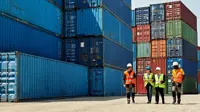Insights
We’ve gathered our insight and expertise into one knowledge base. Explore our advice, research, guides and reports to inform business decisions.

Our International construction market survey brings together data, industry insights and experience, covering over 91 global markets.

Canada market intelligence: finely balanced
Our Q2 2024 Canada market intelligence report provides market and provincial analysis, as well as economic insights and advisory from our experts.

Integrated and outcome-focused commercial models
Our Transforming performance major programmes content series has highlighted the changing roles and ambitions of global infrastructure programmes.

Malaysia's commitment to net zero in real estate
As Malaysia's construction industry continues to grow, its government must formulate a long-term plan around sustainability.

Interview: from British Army to Turner & Townsend
In our Spotlight on inclusivity interview, Ed Robinson discusses what attracted him to working for a major programmes consultancy firm.

Hybrid real estate boosts life sciences innovation
Research and development (R&D) campuses are increasingly marked by a fusion of lab and office space as pressures around the speed of delivery mount.

International construction market survey 2024
Our International construction market survey brings together data, industry insights and experience, covering over 91 global markets.

Delivering data centres in an AI-driven world
Power availability is the top priority for data centre investors and developers working to meet high levels of demand in the Asia-Pacific region.

Impact of COVID-19: Australian construction sector
The lasting legacies of the COVID-19 pandemic still influence the construction sector and are likely to continue for many years to come.

Hong Kong market intelligence: economic resilience
Our Hong Kong market intelligence report emphasises the importance of strategic procurement and innovative delivery models as drivers for growth.

US market intelligence: a change in pace
Our US market intelligence report provides market and regional analysis for the region, as well as economic insights and expert advisory.
Explore our publications

International construction market survey 2024

Spotlight on inclusivity

Global occupier fit-out report 2023




